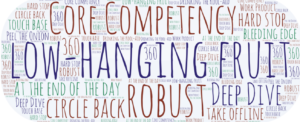
Several years ago Forbes magazine staged a playoff bracket among 32 corporate jargon “abominable expressions” to determine the most annoying one. Each day two expressions were matched against each other and Forbes readers voted on the phrase that advanced in the playoff bracket.
Some strong contenders made the playoffs: core competency, burning platform, open the kimono, lots of moving parts, it is what it is, boil the ocean, take offline, giving 110%, leverage, ecosystem, robust, and so on.
Some of my own personal favorites – at the end of the day, deep dive, drill down, unpack, disruptive innovation, low-hanging fruit, touch base, circle back, work product – did not make it to the championship rounds.
The problem with buzzwords is that they reflect poorly on the writer or speaker using them. The abominable expressions suggest you are just a little too lazy, or inarticulate, or dismissive of the audience. Otherwise respected leaders and managers undermine themselves through use, and especially overuse, of these words and phrases.
Imagine coming to the office in your finest suit coat and most fashionable shoes, wearing your most worn out sweat pants as part of the ensemble. Buzzwords and clichés are those sweat pants. Beware of consultants who come calling wearing those sweat pants.
Forbes was more explicit: “The next time you feel the need to reach out, touch base, shift a paradigm, leverage a best practice or join a tiger team, by all means do it. Just don’t say you’re doing it. Because – and please believe us – all that meaningless business jargon makes you sound like a complete moron.”
In a Huffington Post article, writer Maddie Crum cited a New York University study that abstract language leads listeners to believe a speaker is lying more often than concrete language does. Further, she noted, office speak “can be aggressive, patriarchal and, when you really consider the language, remarkably unprofessional” – killing it, bleeding edge, targeting clients with guerilla marketing. “The use of a vapid verbal shortcut is an attempt to convey a point without pausing to consider whether or not the correct point is being conveyed, or whether or not the point is worth conveying at all,” she wrote.
So, how did the Forbes playoffs come out? Empower beat scalable; vertical beat ecosystem; reach out beat learnings; best practice beat hard stop; peel the onion beat out of pocket.
Ultimately, empower, leverage, it is what it is, and drinking the Kool-Aid made the finals. The champion in the Forbes playoffs was – Drinking the Kool-Aid. Underscoring one of Crum’s points, the origin of the phrase is the tragic Jonestown mass suicide in 1978 when more than 900 people followed their leader to the grave by drinking a deadly concoction. This is not exactly a fitting phrase for an office setting where we might be discussing alignment of employees or business practices.
To achieve your most respected position, whether in business or everyday life, dress your best. Actively practice rejecting the clichés and empty phrases of the moment. Define yourself as authentic by being clear and detailed in the expression of your thoughts – using your own words and phrases.